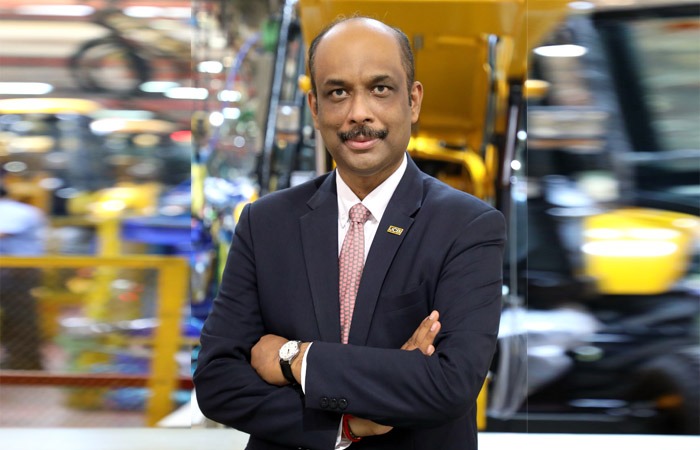
Our focus is on enhancing machine efficiency through tech
Can you share more details about JCB's recent announcement regarding its investment in super-efficient hydrogen engines?
We are excited to share that JCB has embarked on a groundbreaking initiative to produce super-efficient hydrogen engines, backed by a substantial investment of £100 million. This cutting-edge technology is designed to achieve a net-zero carbon emission target by 2050, aligning with global efforts to address climate change.
Could you elaborate on the specific machines introduced at the Excon that highlight JCB's hydrogen technology?
At Excon, JCB introduced several machines that demonstrate our commitment to decarbonising the construction sector. Notably, we showcased the JCB hydrogen-powered backhoe loader and the JCB 3DX hydrogen machine, both equipped with our innovative hydrogen combustion engine. These machines represent a significant step forward in incorporating sustainable technology into our product lineup.
How does this hydrogen combustion technology contribute to the broader goals of decarbonisation and sustainability?
The introduction of hydrogen combustion technology is a pivotal move towards decarbonising the construction sector. By utilising hydrogen fuel cells, we aim to achieve a net-zero carbon emission status by 2050. This aligns with global efforts to combat climate change and underscores our commitment to sustainable practices within the construction industry.
Can you elaborate on the company's commitment to ESG values and its impact on various aspects of the business?
Our commitment to ESG values is integral to every facet of our business. We actively engage with our dealers who share our dedication to sustainable practices, particularly in establishing service centers. This responsibility is not confined to a specific segment; rather, we scrutinise every aspect of our operations through an ESG lens. Whether it's strategic planning or collaborating with suppliers collectively, we consistently strive to make a positive impact. An example of our environmental commitment is our collaboration with the Ministry of Railways, where we've been instrumental in transporting machines to various locations, domestically and potentially internationally.
What technical challenges do you foresee in the conventional intelligent vision for the future of the industry, and what solutions are you contemplating?
I view these challenges as fantastic opportunities. Our focus is on enhancing machine efficiency through technology, particularly in electronics and AI. We are dedicated to making our machines more user-friendly, especially for new operators. I don't perceive any restrictions; instead, I see a bright future where India can lead the world in technological advancements. Our technology is on par with global standards, and India has the potential to excel, particularly in the innovations we initiate here.
What are your expectations and inspirations for the upcoming years, given the substantial government investments in infrastructure development?
Looking ahead, I see tremendous opportunities in the coming years. The government's substantial investments in infrastructure development, such as roads and railroads, present a promising landscape for our industry. With India poised to become the second-largest construction equipment market globally, our focus aligns with the government's initiatives. We are confident that our industry will thrive, and we are well-prepared to contribute significantly.
Could you shed light on the company's international presence and its unique approach to manufacturing?
JCB stands out due to our consistent approach to manufacturing. All our factories adhere to the same processes, regardless of whether a machine is destined for an Indian customer or one in the USA. This uniformity in technology and processes is a testament to the quality of our machines. Notably, our machines produced in India are exported to over 30 countries worldwide, with 50 per cent of this years exports going to North America. This emphasises the global recognition of the excellence in engineering and manufacturing that we uphold.
Regarding your mention of hydrogen, could you provide more details on the technology involved and its significance?
Certainly, we utilise Isogen, an internal combustion engine powered by hydrogen fuel cells. This technology represents a groundbreaking solution to address environmental concerns. By replacing fossil fuels with hydrogen, we contribute to a zero-carbon footprint. Weve been pioneers in this approach, with 330 public programmes following our lead. This technology is not just about the present but also about creating a sustainable future.
Could you share insights into the company's efforts in developing and testing new products, especially those related to hydrogen technology?
Our primary focus is on perfecting the backhoe loader, a crucial machine in India. We are committed to testing and refining its functionality, ensuring it aligns perfectly with India's requirements. Despite the inherent challenges, our engineering team is dedicated to overcoming them. We believe the future holds great promise, especially as we continue to innovate and meet the evolving needs of the market.
How does the company anticipate the market's readiness for new machines, particularly in rural areas and upcoming infrastructure projects?
We recognise that the demand for machines is closely tied to infrastructure development, particularly in rural areas. With the government's significant investments in roads and other projects, we are poised to meet the market's needs swiftly. Our readiness to launch solutions aligns with the markets progression, ensuring that we stay one step ahead of the curve.


 +91-22-24193000
+91-22-24193000 Subscriber@ASAPPinfoGlobal.com
Subscriber@ASAPPinfoGlobal.com